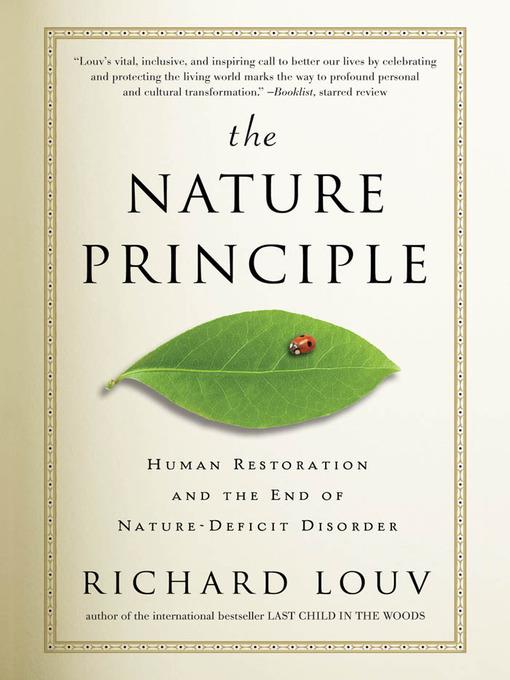
The Nature Principle
کتاب های مرتبط
- اطلاعات
- نقد و بررسی
- دیدگاه کاربران
نقد و بررسی

January 31, 2011
In this sanguine, wide-ranging study of how humans can thrive through the "renaturing of everyday life," Louv takes nature deficit disorder, introduced in his seminal Last Child in the Woods, a step further, to argue that adults need nature, too. "A reconnection to the natural world is fundamental to human health," he writes, asking, "What would our lives be like if our days and nights were as immersed in nature as they are in electronics?" Louv's "Nature Principle" consists of seven precepts, including balancing technology excess with time in nature; a mind/body/nature connection, which Louv calls "vitamin N," that enhances physical and mental health; expanding our sense of community to include all living things; and purposefully developing a spiritual, psychological, physical attachment to a region and its natural history. The book presents examples of these precepts, from studies of how exposure to a common soil bacteria increases production of serotonin in the brain to designing shopping malls inspired by termite mounds. Although lightweight for longtime nature lovers, the book may be just what our high-tech, urban culture needs to bring us down to earth.

May 15, 2011
A sound argument for the importance of the natural world.
Readers needn't be poets to understand that nature inspires more than five senses, but many would probably benefit from this exploration of nature's significance in our lives and what role it will play in the future. Award-winning science journalist Louv (Last Child In the Woods, 2008, etc.) returns with a discussion of the seven precepts of natural power, introducing such concepts as the "purposeful place," where natural history is as highly valued as human history. While the author comes across as a bit self-obsessed and the book is written to suburban and urban audiences, his writing style is clear and raises many valid points—most of which anyone with a small degree of common sense could figure out on their own. Don't we already know that technology is not bad when used as a tool, or that exposure to nature helps well-being and may even cause physical healing? Louv heartily exhorts readers to become more engaged in the world around them, as citizen naturalists out to discover their own bioregions. Taking time to find and create an everyday Eden is not only beneficial to the individual, but to the community as a whole.
Louv's latest isn't much more than age-old wisdom, but it bears repeating in an asphalt-coated world.
(COPYRIGHT (2011) KIRKUS REVIEWS/NIELSEN BUSINESS MEDIA, INC. ALL RIGHTS RESERVED.)

Starred review from March 1, 2011
Louv struck a resounding chord in the best-selling Last Child in the Woods (2005) when he identified nature-deficit disorder, a debilitating syndrome affecting children who spent scant time playing outdoors. But what about adults? Louv distills his latest findings about our lifelong need for direct experience of nature into another essential concept, the Nature Principle, which holds that reconnection to the natural world is fundamental to human health, well-being, spirit, and survival. A prodigious researcher and inspired interpreter and synthesizer, Louv offers a finely crafted interdisciplinary argument to support this claim, drawing on eye-opening scientific and medical studies as well as the timeless observations of poets. Louv profiles such trailblazers as public-health expert Howard Frumkin and South Central L.A. ecoactivist Juan Martinez as well as citizen naturalists who are strengthening our understanding of the crucial connections between human, economic, and ecosystem health. As he cogently explains why time spent in nature is quantifiably therapeutic, Louv reminds us that nature is everywhere and that the simplest of engagements with nearby nature, such as taking a walk or admiring a tree, are immensely restorative to mind and body. Louvs vital, inclusive, and inspiriting call to better our lives by celebrating and protecting the living world marks the way to profound personal and cultural transformation.(Reprinted with permission of Booklist, copyright 2011, American Library Association.)

























دیدگاه کاربران